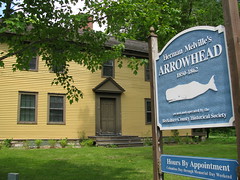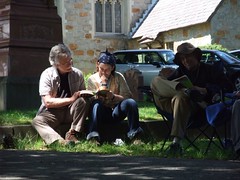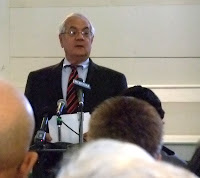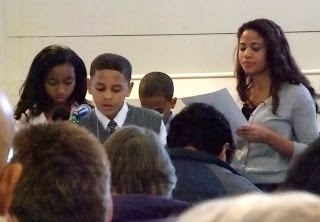A Low-Key Bloomsday Mini-Marathon
 |
| Click for a few snaps from the Ramble |
Just back from the 17th Annual "
Worcester Ramble," a day of readings from Joyce's
Ulysses, staged at various locations throughout the city (
Worcester, MA). Although only a few months older than our beloved Moby-Dick Marathon (which turns 17 in January, 2013), they are quite different events.
First, the text. The Ramble doesn't even attempt to read the entire text of its target tome.
Ulysses is about the same length as
M-D, but it's hard (for me) to imagine any audience sitting through its entirety. Joyce's stream-of-consciousness style — the non-sequiturs, invented words, oddball punctuation, etc. — and stylistic experiments — the language of Chapter 14 evolves through Latinate classical medieval, Germanic pre-Norman, High medieval, Renaissance,... — may make the text interesting to read, but seem to make it less engaging to listen to. The abstruse references to Irish popular culture circa 1904 don't help its accessibility either.
Also, the story of
Ulysses is less conventionally dramatic than that of
M-D: a middle-aged advertising salesman and a twenty-something intellectual slacker wander around Dublin for a day, meeting each other after midnight, and returning to the elder's house to crash while the wife is upstairs basking in the glow her recent affair. Not at all like the apocalyptic confrontation that is the climax of irresistible Ahab meeting immovable Moby Dick ("
from hell's heart I stab at thee..."). Many of us boomers were exposed to
M-D in school or
on TV, and the opportunity to painlessly familiarize ourselves with the text is tempting. Not so with
Ulysses. Although John Huston directed a very fine version of Joyce's short-story
The Dead, a creditable film version of
Ulysses is yet to be made. (Perhaps the missing factor is a Ray Bradbury adaptation?)
Next, the venue. The MDM is truly blessed with the New Bedford Whaling Museum, its building as well as its staff and volunteers. Within the museum the MDM takes advantage of several "locations," and we merely have to walk across the street to experience Father Mapple's sermon in a chapel that was rebuilt in the image of John Huston's film set. The Ramble's audience numbers only about twenty, so organizers are free to lead us to locations throughout Worcester that are "evocative" of places in Dublin: a
stone tower, a period cemetery, and a couple of pubs. (
I was blue mouldy for the want of that pint...)
Finally, the size of the audience. By design or by fate, the Ramble is very much a small event. It has a DIY feel, a flexibility which the sleek vessel that is the MDM could not accommodate. The Ramble's organizers schedule a different set of chapters each year, but the group isn't hesitant to suggest changes as the day progresses. The quality of the readings is variable at both marathons, but the Ramble audience feels free to call out help with pronunciations or make extra-textual remarks; given the small numbers, these are tolerable disturbances. And while we have to suffer the hoarse, snarling shouts of some faux-salts at the MDM (dude, it's
not Talk Like A Pirate Day!), there were no fake Irish accents heard at the Ramble, saints be praised.
Ulysses is much more focused on a particular day than
Moby-Dick is focused on January 3, or on the city of New Bedford. Like Christmas, Bloomsday is one of those festivals that cannot be moved to the nearest weekend. The Ramble continues to be held on June 16, regardless of the day of the week.
If you're trapped in the cultural gravitational field of Boston or Northampton, keep an eye on the
Worcester County Poetry Association, especially as Sunday, June 16, 2013 approaches.


















































